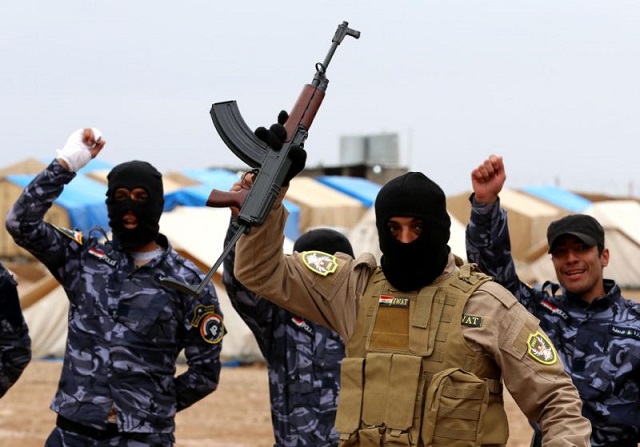
Washington, United States | AFP | The Iraqi military’s hard-fought victory over the Islamic State group in Mosul marks a defining moment not just for them. It is also a key win for the US doctrine behind it.
Instead of putting large numbers of American boots on the ground, the US-led strategy in Iraq and Syria has been a non-stop air campaign combined with continual training and advising for proxy local forces.
Pentagon officials say the outcome is clear — three years after collapsing as flag-waving jihadists swept across their country, Iraq’s security forces have become a battle-hardened army that prevailed in a brutal urban fight.
“Training works,” said one senior US military officer who was deployed to Iraq from 2015-’16. It “has enabled the Iraqis to take back their country.”
It’s a far cry from when then-Pentagon chief Ashton Carter said in May 2015 that the Iraqi military “showed no will to fight.”
When IS attacked in 2014, the Iraqi security forces had grown weak under then-prime minister Nouri al-Maliki.
Troops turned and ran, often without a fight, dumping precious US-provided weaponry and vehicles as they fled.
“It was stunning,” the military official said.
“Even ISIS had to have been surprised at how rapidly the Iraqi army utterly just fell apart.”
The skills they’d learned under previous US tutelage from 2008-2011 centered on fighting an insurgency — not stopping a fast-moving jihadist army.
“We needed an army that could fight conventionally,” the official said.
The decision to use a few hundred US troops and other Western military experts to train local fighters stems partly from the Iraq War, which saw more than 4,400 US troops die.
A US public wary of additional deployments did not want Barack Obama recommitting more combat troops.
– New skills –
Obama ordered air strikes and pursued a strategy — known in the Pentagon as “by, with and through” — to train local forces.
In the summer of 2015, coalition advisers started instructing Iraqis on conventional warfare — fighting in small units, setting up defenses, how to breech minefields and so on.
By the end of that year, the Iraqis began striking back at IS, including with the recapture of Ramadi.
As of this month, the coalition had trained about 106,000 Iraqi security forces, including 40,000 Iraqi troops, 15,000 police, 6,000 border guards, 21,000 Kurdish peshmerga, 14,000 from the elite Counter Terrorism Service and another 9,500 “tribal mobilization forces.”
 The Independent Uganda: You get the Truth we Pay the Price
The Independent Uganda: You get the Truth we Pay the Price





